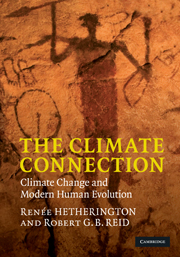Book contents
- Frontmatter
- Contents
- Foreword
- Preface
- Acknowledgements
- 1 Introduction
- Part I Early human history
- Part II Climate during the last glacial cycle
- Part III The interaction between climate and humans
- 7 The interaction between climate and humans
- 8 Climate and agriculture
- 9 Climate and our future
- Appendices: The biological background to the story of evolution
- References
- Index
- Plate section
9 - Climate and our future
Published online by Cambridge University Press: 05 August 2012
- Frontmatter
- Contents
- Foreword
- Preface
- Acknowledgements
- 1 Introduction
- Part I Early human history
- Part II Climate during the last glacial cycle
- Part III The interaction between climate and humans
- 7 The interaction between climate and humans
- 8 Climate and agriculture
- 9 Climate and our future
- Appendices: The biological background to the story of evolution
- References
- Index
- Plate section
Summary
What then of the effects of climate change?
Climate change is not new. The Earth has experienced significant climate variability over the last 650,000 years and more particularly within the time of modern human existence. However, relatively speaking, global climate over the last 10,000 years has remained relatively stable. Modern humans took advantage of this stability. We developed agriculture and domesticated animals. We further enhanced the stable environment by storing food in good times for use during lean times. Irrigation enabled modern humans to grow crops in regions otherwise prohibitive. As a result, growing seasons could be lengthened and water stored for use in times of drought. We migrated to more distant and less hospitable regions, building shelters and subsequently moved into more extreme environments by further stabilizing and controlling our environment. The modern human population expanded as did our dominance over the land and other species. Yet this dominance required an increasing dependency on energy and technology. Today we have become so heavily dependent on energy and technology that we expect them to protect us from all manner of natural and climatic vagaries.
Our growing obsession with, and economic dependency on, fossil fuels, combined with our penchant for consumerism, has resulted in humans becoming a climate-change mechanism. Our behaviour is now influencing global climate, both today and in the future.
- Type
- Chapter
- Information
- The Climate ConnectionClimate Change and Modern Human Evolution, pp. 269 - 302Publisher: Cambridge University PressPrint publication year: 2010



